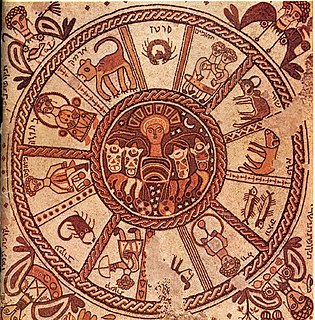
Astrology is a pseudoscience that claims to divine information about human affairs and terrestrial events by studying the movements and relative positions of celestial objects. Astrology has been dated to at least the 2nd millennium BCE, and has its roots in calendrical systems used to predict seasonal shifts and to interpret celestial cycles as signs of divine communications. Many cultures have attached importance to astronomical events, and some—such as the Hindus, Chinese, and the Maya—developed elaborate systems for predicting terrestrial events from celestial observations. Western astrology, one of the oldest astrological systems still in use, can trace its roots to 19th–17th century BCE Mesopotamia, from where it spread to Ancient Greece, Rome, the Arab world and eventually Central and Western Europe. Contemporary Western astrology is often associated with systems of horoscopes that purport to explain aspects of a person's personality and predict significant events in their lives based on the positions of celestial objects; the majority of professional astrologers rely on such systems.

Geoffrey Charles Ryman is a Canadian writer of science fiction, fantasy, slipstream and historical fiction.

Science fiction is a genre of speculative fiction that typically deals with imaginative and futuristic concepts such as advanced science and technology, space exploration, time travel, parallel universes, and extraterrestrial life. It has been called the "literature of ideas", and it often explores the potential consequences of scientific, social, and technological innovations.

Electional astrology, also known as event astrology, is a branch found in most traditions of astrology according to which a practitioner decides the most appropriate time for an event based on the astrological auspiciousness of that time. It differs from horary astrology because, while horary astrologers seek to find the answer to a question based on the time the question was asked, electional astrologers seek to find a period of time which will result in the most preferable outcome for an event being planned.

Astrological beliefs in correspondences between celestial observations and terrestrial events have influenced various aspects of human history, including world-views, language and many elements of social culture.

Astrology and astronomy were archaically treated together, and were only gradually separated in Western 17th century philosophy with the rejection of astrology. During the later part of the medieval period, astronomy was treated as the foundation upon which astrology could operate.

An astrological age is a time period in astrological theory which astrologers say parallels major changes in the development of Earth's inhabitants, particularly relating to culture, society, and politics. There are twelve astrological ages corresponding to the twelve zodiacal signs in western astrology. Advocates believe that when one cycle of the twelve astrological ages is completed, another cycle of twelve ages begins. The length of one cycle of twelve ages is 25,860 years.
Jim Lewis was an astrologer, writer and entrepreneur. He is best known for pioneering the technique of Astrocartography.

Astrology has been a topic of debate among Jews for over 2000 years. While not a Jewish practice or teaching as such, astrology made its way into Jewish thought, as can be seen in the many references to it in the Talmud. Astrological statements became accepted and worthy of debate and discussion by Torah scholars. Opinions varied: some rabbis rejected the validity of astrology; others accepted its validity but forbid practicing it; still others thought its practice to be meaningful and permitted. In modern times, as science has rejected the validity of astrology, many Jewish thinkers have similarly rejected it; though some continue to defend the pro-astrology views that were common among pre-modern Jews.
In subcultural and fictional uses, a mundane is a person who does not belong to a particular group, according to the members of that group; the implication is that such persons, lacking imagination, are concerned solely with the mundane: the quotidian and ordinary. The term first came into use in science fiction fandom to refer, sometimes deprecatingly, to non-fans; this use of the term antedates 1955.
Descendant(s) or descendent(s) may refer to:

Dr. Marc Edmund Jones was an American writer, screenwriter and astrologer.
Judicial astrology is the art of forecasting events by calculation of the planetary and stellar bodies and their relationship to the Earth. The term "judicial astrology" was mainly used in the Middle Ages and early Renaissance to mean the types of astrology that were considered to be heretical by the Catholic church, distinguished from the "natural astrology" such as medical astrology and meteorological astrology, which were seen as acceptable because they were a part of the natural sciences of the time.

Horoscopic astrology is a form of astrology that uses a horoscope, a visual representation of the heavens, for a specific moment in time in order to interpret the inherent meaning underlying the alignment of the planets at that moment. The idea is that the placement of the planets at any given moment in time reflects the nature of that moment and especially anything that is born then, and this can be analyzed using the chart and a variety of rules for interpreting the "language" or symbols therein.

Nicholas Campion is a British astrologer and historian of astrology and cultural astronomy. He is the author of a number of books and currently pursues an academic career.

Babylonian astrology was the first known organized system of astrology, arising in the second millennium BC.

Mundane science fiction (MSF) is a niche literary movement that developed in the early 2000s (decade) which proposes "mundane science fiction" as its own subgenre of science fiction. MSF is typically characterized by its setting on Earth or within the Solar System; a lack of interstellar travel, intergalactic travel or human contact with extraterrestrials; and a believable use of technology and science as it exists at the time the story is written or a plausible extension of existing technology. The key tenets of the movement were set out in a 2004 manifesto written by Geoff Ryman and anonymous collaborators. There is debate over the boundaries of MSF and over which works can be considered canonical. Rudy Rucker has noted MSF's similarities to hard science fiction and Ritch Calvin has pointed out MSF's similarities to cyberpunk. Some commentators have identified science fiction films and television series which embody the MSF ethos of near-future realism.

Some medieval Muslims took a keen interest in the study of astrology, despite the Islamic prohibitions: partly because they considered the celestial bodies to be essential, partly because the dwellers of desert-regions often travelled at night, and relied upon knowledge of the constellations for guidance in their journeys. After the advent of Islam, the Muslims needed to determine the time of the prayers, the direction of the Kaaba, and the correct orientation of the mosque, all of which helped give a religious impetus to the study of astronomy and contributed towards the belief that the heavenly bodies were influential upon terrestrial affairs as well as the human condition. The science dealing with such influences was termed astrology, a discipline contained within the field of astronomy. The principles of these studies were rooted in Arabian, Persian, Babylonian, Hellenistic and Indian traditions and both were developed by the Arabs following their establishment of a magnificent observatory and library of astronomical and astrological texts at Baghdad in the 8th century.
Saturn is a planet in the Solar System.







